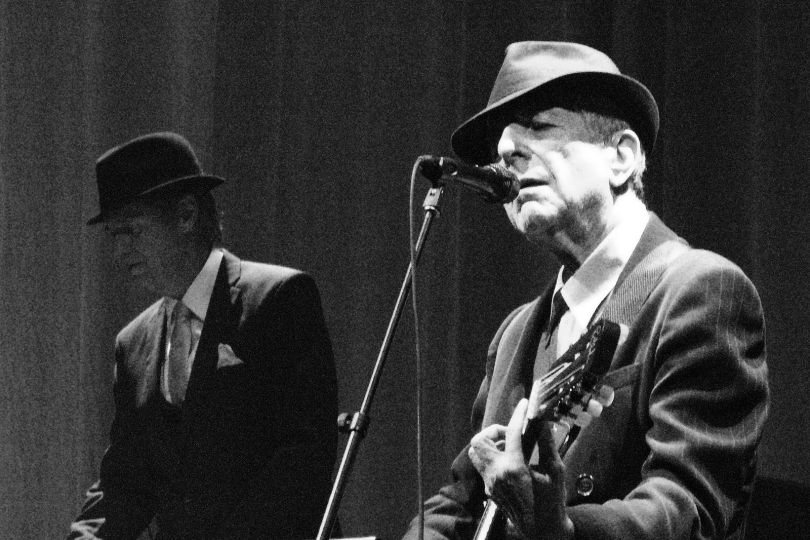
Covered #2: Leonard Cohen – Hallelujah
This series is not just about featuring hits and evergreens, that wouldn't be enough. It aims to present songs that have succeeded not only in their original version but also in many other renditions. A lot of covers are described as "better than the original" and in many cases, only a few people know the original. Sometimes there is even a dispute as to which version came first. The songs we are going to talk about and, more importantly, whose cover versions we are going to present, won't be based on the place or time of their creation, and definitely not on their original musical genre. Folk, jazz, blues, rock, pop or musical, we can find interesting songs anywhere. Today we take a look at "Hallelujah" by Leonard Cohen.
This is one of the most paradoxical song stories ever. Today, everyone knows this song, even if they don't know anything else by Leonard Cohen... Actually, maybe not everyone associates it with this Canadian singer-songwriter. It was made famous by others and elsewhere, and only after many twists and turns did its author manage to carve it into a perfect gem.
This year marks forty years since "Hallelujah" was first released by Leonard Cohen on the album Various Positions, and he also chose it as the second single from the record, pretty much without any success. For reasons that are unclear today, the song was overlooked and seemed to fade into obscurity. But let's face it: seen through the lens of what followed, the original version isn't really the best one.
It is said that Leonard Cohen spent five years composing his "Hallelujah", and if we were to add up all the verses he wrote, rewrote, arranged and discarded, we would arrive at the staggering number of one hundred and fifty. One of the paradoxes associated with the song is that it was originally rejected even by Columbia, the label for which Cohen recorded. Thus, the song initially lay fallow, though those with good ears must have liked even the first version. One of those people – and this brings us to our main topic, cover versions – was Bob Dylan, who first included it in his repertoire in 1988 and occasionally played it.
But the real "discoverer" of Hallelujah is, as many people probably suspect, John Cale. While preparing the Cohen tribute album I'm Your Fan (1991), he chose this underrated song, asked Cohen for its lyrics, and Cohen reportedly sent him fifteen pages. Cale crossed out a considerable part of it (which other English-language cover artists did as well – the song actually exists in dozens, probably hundreds of versions, and almost every time with a different choice of lyrics) and recorded it alone with a piano. It was a hit, and then when Cale released the beautiful Fragments of a Rainy Season album a year later, "Hallelujah" featured there too. And it became an integral part of Cale's repertoire in his solo performances.
Although John Cale drew attention to "Hallelujah", it mostly appealed to more "alternative" circles, but it was nothing big. The song was undeniably helped by two things. Firstly, the young and prematurely deceased singer-songwriter Jeff Buckley noticed it and included it on his only full-length album, Grace (1994), and his version reached different ears than Cale's.
Secondly: the song took on a life of its own as part of soundtracks of films and various TV shows. Cale's version was featured in Basquiat (1996), but gained the most notoriety thanks to the animated hit Shrek (2001) – and it was probably then that the song skyrocketed among the world's best-known and most covered songs in the world. Another paradox associated with "Hallelujah" is that the commercially very successful soundtrack didn't feature Cale's version, that is, the actual film version, but a cover by singer Rufus Wainwright, albeit in Cale's arrangement.
Reportedly, there are around three hundred "Hallelujah" cover versions. Personally, I consider that to be a very, very underestimated number because the song is truly one of the most sung ever, regardless of the quality of the result. And the song is indeed considered – because few people actually understand the lyrics, it is pure poetry balancing between faith and eroticism, as it is usually stated – to be the ideal hymn for any occasion, from weddings to funerals. And for example, for the opening of the 2010 Vancouver Olympics, as performed by Canadian singer k.d. lang – beautifully and with style, of course.
And then there are cover versions from the category of totally bizarre, like this one by a Czech brass band. There's no need to get upset about it, just let yourself be carried away...
In the end, let's go back to the beginning to get to the point of this strange story. When Leonard Cohen started performing again after a long break, he naturally included the now resurrected "Hallelujah" in his "best of" repertoire. And it was a fantastic experience every time I heard him sing it, the best version of this song you can get – not only thanks to Cohen's soulful delivery but also thanks to a great arrangement and a fabulous band, featuring exotic string player Javier Mas and organist Neil Larsen. And it is precisely with this splendid performance that we bid farewell to "Hallelujah".
If you have found an error or typo in the article, please let us know by e-mail info@insounder.org.



